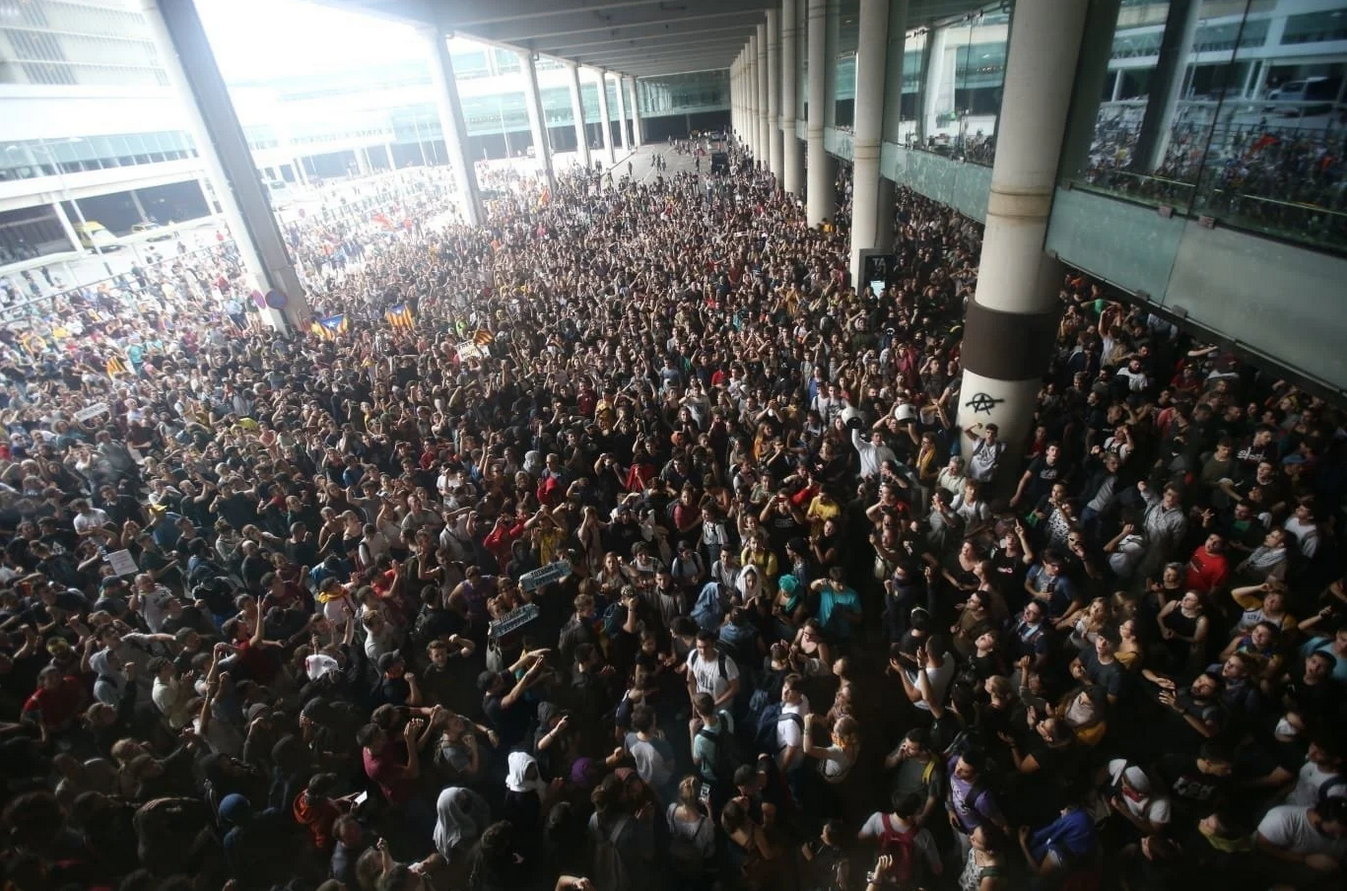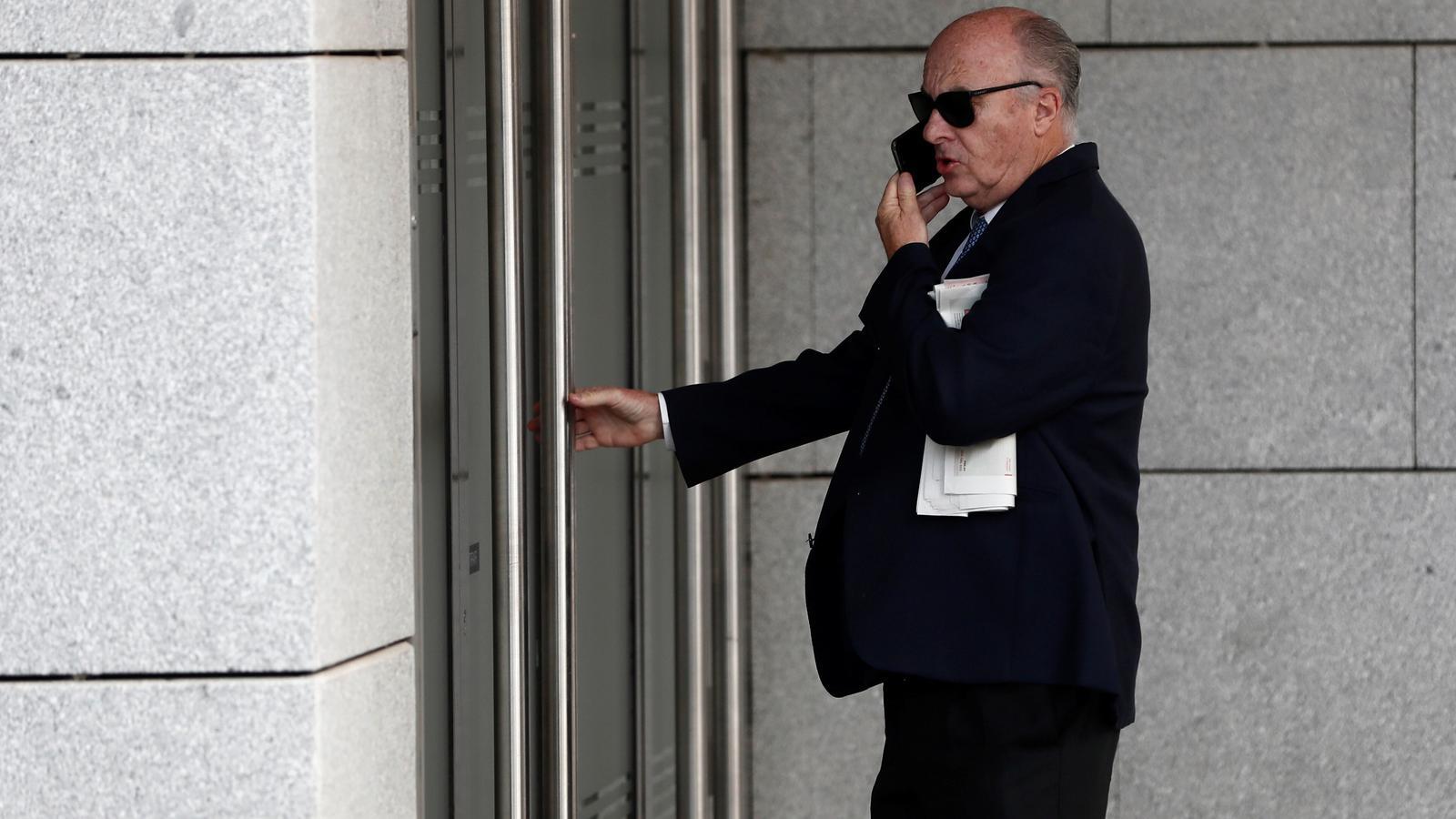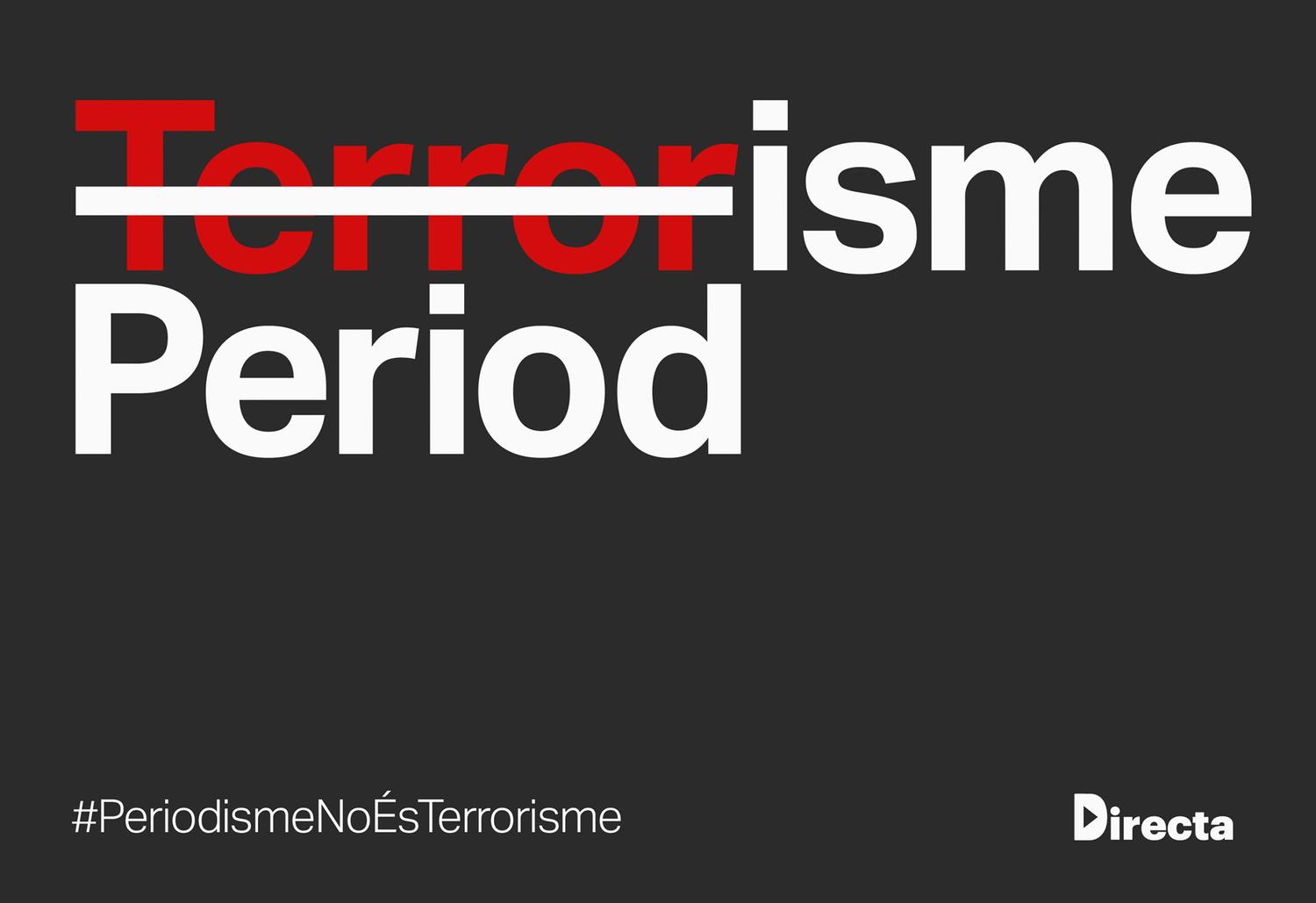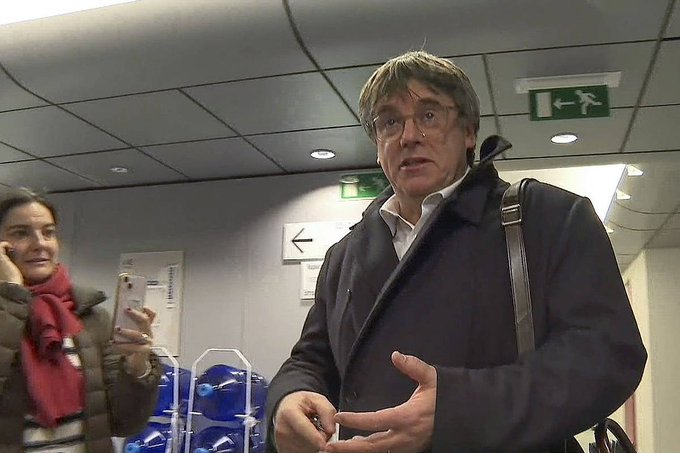"We won't have a just cause; this script was already written."
- The recent Amnesty Law passed by the Spanish Government will not leave all Catalans condemned in peace. Some are still in exile and will continue to wait until when. But others have left recently, when it was supposedly about to end the “conflict”, when parties were negotiating the Amnesty Law. The National Court has removed from the table the crime of terrorism so that some people are left out of the Amnesty Act. The interview was video-recorded by ARGIA.

In a city where rain persists, the weekend at the end of May has been sunny. “For the first time such a good time,” he told ARGIA shortly after landing in Geneva (Switzerland) Jesús Rodríguez. In Geneva it has also been a splendid time, but in summer; those who have been living it since November have not known it so far. Rodriguez is attentive to the phone, as in addition to ARGIA, he has to manage another visit in the afternoon. It will not be the first or the last. The Catalan exiles who are in Switzerland receive numerous visits, especially those who have left recently, as it is not easy to be six or seven years out and that people continue to visit so often.
Geneva is a transit city. Visitors keep their arms open in Switzerland, if you return as you have gone, or if you come for a lot of money. Or to work, but to earn at least 5,000 euros a month. Every day some 40,000 French people cross the border to go to work. The reason for this is that the average wage is not far from EUR 8,000 per month. So let's think about how expensive it is to live there.
But for the Catalans it is a good place for exile: because it is close enough to start, but also because the Swiss Government understands the Catalan political issue as Spain, so it has not wanted to cooperate with the Spanish judiciary.
The Catalans had already prepared the ground since 2017. Those who are still there have helped the newcomers in the adaptation. The minimums have been guaranteed, as they are housing. But mental preparation is not that easy, much less in the middle of such a media case. They've had a special point on the dates they've been with ARGIA: It was only a few days before the Amnesty Act was passed; there was nothing else in his head.
Rubén Wagensberg
Barcelona 1986. Member of ERC, in the Parlament since 2018. He is a member of the Bureau of Parliament. Social activist, especially in the field of migration, refugees, etc.
He's been in exile for half a year. The Supreme Court accuses him of a crime of terrorism and violation of human rights, as he allegedly participated in the Democratic Tsunami and organised, directly, demonstrations at Barcelona Airport.
Jesús Rodríguez
Santa Coloma de Gramenet, 1974. He is a journalist in the Direct program of the Catalan countries. It is a cooperative means of communication based in the Sants district of Barcelona. He has carried out extensive journalistic research work, publicizing cases such as police abuse or infiltration, among others.
He has been in exile since last November. The National Court has charged him with a terrorist offence for having known for about a month several acts of road-cutting in Spain. Another 25 journalists were also under investigation, as they had handled information similar to what they had in their possession. But Rodríguez sent the information to a person that Carles Puigdemont. He's joined links...
How are you?
Jesús Rodríguez: We're adapting. It was hard to make a decision, to come and land here. It was neither planned nor prepared. We have had to start from scratch. We have been here for half a year and I can say, in both cases, that we have guaranteed the minimum living standards. On a personal level, I myself, I'm fine. Of course, uncertainty is very big.
How do you go, fast? What body?
Rubén Wagensberg: Our cause, compared to the others, has been very media since the beginning. Since there have been so many leaks and information, we have been able to gauge our situation and we have seen the risk that we had by staying in the Spanish State.
Why Geneva?
Rodríguez: It is a guarantee of respect for fundamental human rights. This city has a significant trajectory with human rights organizations and entities [where the United Nations is located] and historically the people of Catalonia have come here into exile. Switzerland, and especially Geneva. In this country there are thousands and thousands of refugees from all over the world, as Switzerland respects the right to protection of refugees. For example, the Spanish judiciary has requested information from the Government of Switzerland [which had recently asked him to tell him where Marta Rovira lives], but he has always denied it. It is clear that Switzerland understands that ours is a political issue, that of Catalonia, and that is why it does not cooperate with Spain.
.jpg)
Besides the support of several entities and institutions, you have community support, solidarity, from Catalonia in general. This weekend we have seen that you have been visited by friends and friends.
Rodríguez: A strong solidarity network has been set up to show our support, and that is complemented by what we are receiving in Switzerland. In Geneva there are left-wing organizations and there's an anti-fascist space, and a lot of people feel empathy for what's happening in Catalonia. There are two folders: Many people in Switzerland, perhaps, would not share the Catalan independence process, but they see it clear that the Spanish State is acting disproportionately. They do not accept being accused of terrorism for manifesting, organizing demonstrations or whatever. The behaviour of the judiciary in Spain has provoked many alarms here and elsewhere in Europe.
And have you created a network among those in the same cause?
Wagensberg: Many of us didn't know each other beforehand, but now that we live in a similar situation, we've done personal relationships. Despite the fact that we come from very different political areas and that there is a great deal of discussion between parliaments, we, on a personal level, have a different view, but we are taking it very well. Putting yourself on our skin is very difficult for those who do not experience such a situation.
"Our case, compared to the case of others, has been very media since the beginning. As there have been so many leaks and information, we have been able to gauge our situation"
Rubén, you are judged by the Supreme Court, and you, Jesus, the National Court. They are two courts, even if they are the same case. How does it differ?
Wagensberg: [Carles] The case of Puigdemont and I is brought by the Supreme, because he is a MEP and I am a member of the Parliament of Catalonia. The Supreme, however, has fully purchased the arguments of the judge of the National Court who sentenced him for rebellion. It is true that, for the time being, more guarantees are being given. It has given us the opportunity to declare from Switzerland from 17 to 21 June, on a voluntary basis. The National Court, for its part, has forced them to go to the Spanish State, where they remain hospitalized. There is a difference, but nevertheless, it seems to me that the journey of both processes will end in the same place.
Rodríguez: Those of the National Court did not go to the first citation, except for one (Marta Molina, of ERC; it was a statement of two minutes), and now he is about to see if Judge Manuel García-Castellón gives us a second quote, and to see if we can declare exile. Although it raises the possibility, it remains to be seen whether the Swiss Federal Office accepts the request, which was made once and was refused. Or there may be an arrest warrant, we don't know. We have the intuition that García-Castellón will try to bring us back to Spanish territory, and if the accusations of the Civil Guard and the extreme right require precautionary measures, it will order our arrest.
Can the accusations put pressure on the judge?
Rodríguez: The Supreme Court is historically based on the interests of the PP...
Wagensberg: Put 'best', in my case, if the Supreme Prosecutor's Office rejects terrorist offences, I will be judged by the Court of Justice of Catalonia. But we see it as impossible. They need us to be accused of terrorism and of human rights violations, so that we can move away from the Amnesty Act. We cannot think that we are going to have a fair legal issue and we cannot do anything to change the typology.
Rodríguez: What is happening is worrying, and it is worrying that the Tsunami case comes to trial. It is legitimation and establishment of antecedents and jurisprudence for the imputation of a terrorist offence by holding a demonstration. If we are based on what Judge García-Castellón says, on the speech that the Supreme has also approved, why it is not going to be imputed in the future to the farmers who cut the roads, to the taxi drivers who collapse the centres of Madrid and Barcelona, to anyone who goes out to the street to ask or protest anything...
... the spectre of terrorism.
Wagensberg: The accusation is very abstract and subjective. The reform was carried out in 2015 [in the Spanish Penal Code] and since then, judges have more freedom to interpret. The crime of terrorism, in itself, does not exist. Murder, for example, will be murder or terrorism if the judge interprets the political claims of the offender in one way or another. What happens? Interpreting from the letter that true terrorism fades.
We have been with people who are victims of the Islamic State and who have shown their support, as well as victims of the war in Syria and Iraq. Many of them have told us that they do not see what is happening to us well. They agree with us, the Spanish judiciary, calling us “terrorists”, is destroying real terrorism.
Rodríguez: [Spain] The Penal Code states that terrorism is any act that disrupts the constitutional order, when it obliges the state to intervene against its will. “To alter the constitutional order”. It is only three words, which allows judges to accuse those who cut access to public spaces, that is, those who block access to a highway, a port or an airport of terrorism. That goes against the right to protest. Any demonstration wants to achieve what is being claimed, what is not forcing the state to do, and to do so it will cut off the roads. The intention to extend fear is evident.
Wagensberg: We have just seen in France the great protests of the peasants, who have surely brought more people together than the Tsunami. They have not committed any crime, nor in the view of the French judiciary, they would at most have been fined or, at least, they have not been. We are accused of terrorism.
.jpg)
It is charged to twelve people. Why you?
Wagensberg: Because they've recorded phones with Israeli software and they've found text messages that they can take care of. But nothing is proven. That we organize for the demonstrations, that we meet, that we debate a lot and a lot... Tens of thousands of other people would be sure that, in those days, they had sent similar messages. In the talks that they detected me, I said that, in my opinion, the objective was to open a dialogue with the Spanish State, but also that we had to protest in order to tell the world what was happening. The motto Spain sit and talk (Spain, sit down and talk) came out of there, deeply theorized about civil disobedience... Many people would have had that exchange of messages during those days.
That everybody tried to do it in supposedly safe applications and anonymity? This is so, because we have a background in the Spanish state, where a machine has been charged for ballot boxes. That’s why Tsunami was not “a criminal organization.” Anyone who can see the summary will see that the tests against us are very weak. Nor is it proven that we were communicating among the twelve; moreover, we did not know each other.
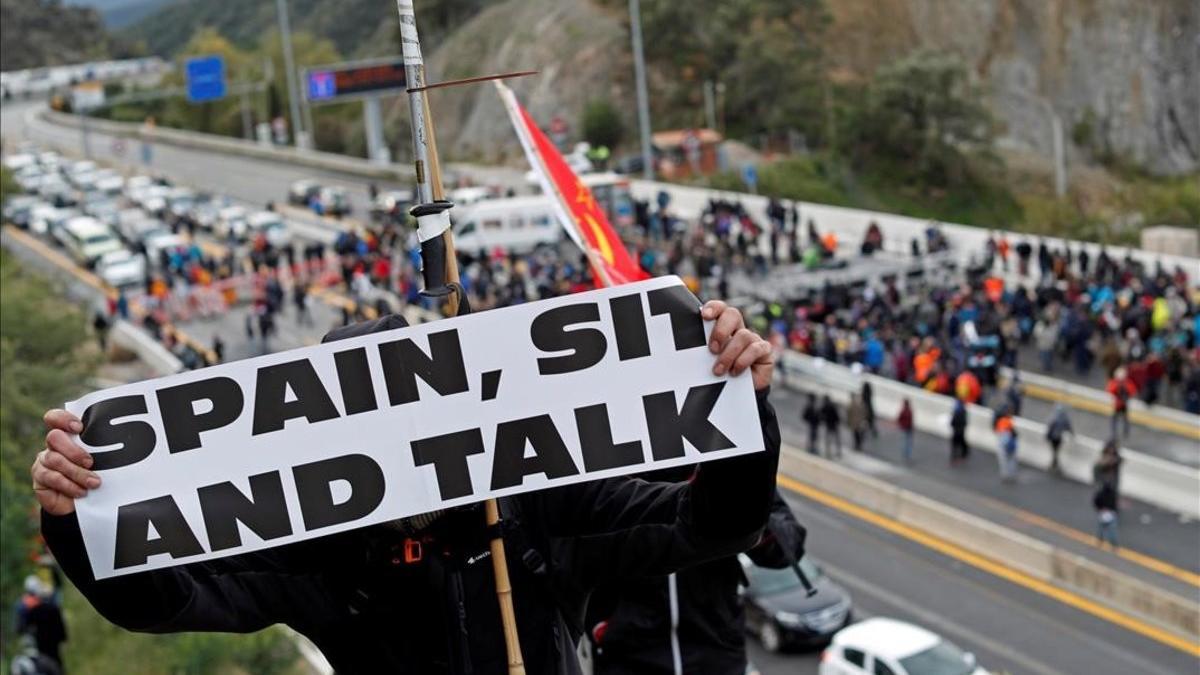
Rodríguez: If we make a more in-depth analysis of the tsunami case, it is clear that the judge's cars and their consequences were preconceived. Interviews have been recorded with over 300 people, 26 of whom are journalists, and the summary has 240,000 pages. Thousands of messages, audio, CDs, mobiles and computers seized were intercepted, all that has been collected in spy programs... All this has happened through special forensic programs to analyze it. The key to me is: Carles Puigdemont and Marta Rovira should be in the case. I talked to a person near Puigdemont, the name of the exiled president appeared, so I too leave.
"By interpreting the crime of terrorism à la carte, real terrorism is eliminated"
It is necessary to differentiate two phases of the case: April and November 2023. Last April, according to information published by the newspaper El Mundo, several people were being investigated or arrested. I contacted the Spanish Ministry of the Interior, through my lawyer, and they told me that I was not being investigated, that at that time there was no message from Puigdemont in the case and that I could be quiet, that it was just news. That's what they passed on to me. The second phase of the case begins after the elections to the Spanish Courts, when the PSOE and Pedro Sánchez needed the support of the independence parties to form government. When they were negotiating the Amnesty Act, when the media debate was in full swing... That's when they found that message. Why then? Because the script was written before. And the script is that neither Puigdemont nor Rovira can enter the Amnesty Law. At the decisive moment the necessary messages have been found, and as the texts of the Amnesty Law are refined, Judge García-Castellón has reinforced the crime of terrorism.
Wagensberg: New actors have also emerged. For example, two policemen who claim to be victims of terrorism. And, unfortunately, the French tourist died of a heart attack in the demonstrations that took place at the airport.
Rodríguez: The judge has actively participated in the search for new figures. He expressly asked the Civil Guard to identify the family of this French tourist, to approach them and "offer them the opportunity" to qualify as victims of terrorism. All this happened after the elections in July, when the Amnesty Law was negotiated. Amazing for some, predictable for others.
Spain does not forgive ...
[Laugh]
Wagensberg: But it always comes in the same way. The judiciary uses every possible means to make policy. It does so firmly, so that they do not forgive us, even the slightest.
Rodríguez: They say that they will never forgive, and politically, that the judiciary will always have to take over the legislative power. I mean, it doesn't matter what people vote. The power of the powers in Spain is judicial and moves mainly around the PP; today also around Vox. The judiciary and the media are monosonorous. PP Senator Ignacio Cosidó was surprised by a photographer to WhatsApp telling him: “We control behind the criminal chamber of the Supreme.” Now, yes, we live it in our skin: they control it from behind.
[Laugh]
It is a disgrace and it must be said loud and clear: in any other democracy in the world all this would lead to a tremendous chain of resignations, from the criminal chamber to politicians. But nothing is happening in Spain, and those who point it out also have to be careful.

Precisely, Jesus, you have investigated in Redín a number of cases of police abuse and infiltrations. It's going to be a mistake: if you wanted to...
Rodríguez: What's happening to me confirms the importance of investigative journalism. The political objective is set by the judges and they are capable of everything. With Tsunami, we're seeing it, and in my case, they knew that my job is uncomfortable for them. In one fell swoop, they now want to end the two.
We are talking on the eve of the adoption of the Amnesty Act. What should we expect? What will it bring for you?
Rodríguez: The Amnesty Act will resolve hundreds of cases, but we will stay out. From the very beginning, the invited actors of García-Castellón will come into play: Vox, Dignity and Justice, Sociat Civil Catalana, Guardia Civil... Allegations will try to bring the process to the end and slow it down.
Wagensberg: We trust the Court of Justice of the European Union. A possible resolution of this can force the Spanish judiciary to apply amnesty to us. When that is the case, if that is the case, we will welcome it. But in a moderate way. We are aware that it will be a political victory, but the independence plans do not end there.
Rodríguez: Three avenues will now be opened, once the Amnesty Law is passed, the King is signed and published in the Official Gazette of Spain. One, that the Amnesty Law be applied directly to us, and we ask that this be the case, but they will not allow us to do so. And the other two paths are aimed at Europe: either the judges themselves are going to consult there, or we are going to go once we receive a resounding refusal from the Spanish judiciary. We will have to see what happens to precautionary and detention measures when the issue is in Europe. And the accusations, for their part, are expected to refer the case to the Constitutional Court, where it is also expected to extend the deadlines for this. Whatever comes, if it comes from Europe in our favour, it is not the same thing that in the Spanish Government there is PSOE-Sumar than PP-Vox... Or if the government of Sánchez fell, the change of representative of the Constitutional would surely change... There are many factors that will influence. No forecasts can be made.
The outbreaks are over Puigdemont. You are on the same issue, but the situation will not be the same: Puigdemont is Puigdemont.
Wagensberg: It's the big hunting prize, and it's also Rovira. But we're all aware, and when we talk to each other we also talk in these terms: it's a collective issue.
Rodríguez: Now I'm being aware of what it means to spend six to seven years in exile. Very few people know what that is. Toni Comín, Anna Gabriel, Carles Puigdemont, Marta Rovira. We felt empathy.
It will be hard weeks and months to come. From the mood, how are you?
Wagensberg: It is curious how the human being adapts to situations... We are better than when we came and prepared to deal with what has to come.
Rodríguez: It's a rollercoaster emotionally. Disconnection is very difficult, much less in such an interconnected world, but we are getting more and more distance and coldness in all the information that comes to us. We're having the opportunity to share and collectivize our own experiences, and that's beautiful.
Wagensberg: If someone from the National Court or the Supreme Court is reading this dialogue, they know that they are not aware of how many and how many entities, associations and institutions have listened to us and how much we are spreading the issue. We've been severely punished, and that's right, I'm not going to deny it, we'd like to go home, but we're getting the best out of the worst.
Walk from a train station, two friends and a hug. This hug will be frozen until the next meeting. I'll come home, he'll stay there. There, too, will be free the painful feeling that injustice wants us to catch. Jesús Rodríguez (Santa Coloma de Gramenet, 1974) is a journalist,... [+]



